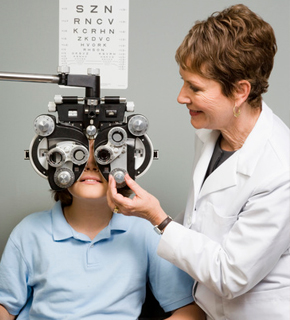An eye fixed exam includes more than just checking to find out if you will need glasses. During a comprehensive eye exam, we not merely determine your prescription for glasses or contact lenses, we assess your eyes’ capability to interact as a team (binocular vision). The dilated part of the comprehensive eye exam allows us to check for eye diseases for example glaucoma, cataract, and macular degeneration; helping us evaluate your vision for indications of systemic disease for example diabetes, hypertension, even brain tumors. Adults and kids needs to have routine eye exams to keep prescriptions current and to check for early signs and symptoms of eye diseases. Early detection can prevent vision loss.
Here’s a list of a few eye conditions and eye diseases that individuals search for throughout a comprehensive eye exam:
Refractive error: This is the eyes’ “optical” prescription. You will find 3 kinds of refractive error, myopia (nearsightedness), hyperopia (farsightedness), and astigmatism (irregular shape to the attention which results in two separate things). These conditions can be corrected with glasses, contacts, and refractive surgery.
Presbyopia: This is the eyes lack of concentration close up. This occurs because of aging. This disorder can be corrected with glasses, contact lenses, and refractive surgery.
Amblyopia: Amblyopia is poor growth and development of central vision because of a turned eye or a large asymmetry (difference) in refractive error between the two eyes. If untreated, amblyopia can slow visual growth and development of the affected eye, be responsible for permanent vision loss.

Strabismus: Strabismus is definitely an eye that turns inwards or outwards in accordance with the other eye. If not dealt with, a strabismus can result in amblyopia, and decrease depth perception.
Glaucoma: Glaucoma will be the degeneration from the optic nerve (a nerve tract that connects and transmits information from your eye for the brain) often related to high eye pressures. Throughout a comprehensive eye exam, we perform numerous tests that reveal if you’ve glaucoma. Since there are virtually no symptoms, it is important to have regular eye exams to prevent permanent vision loss.
Macular degeneration: Macular Degeneration can be a illness that affects the small “sweet spot” (macula) of the retina crucial for acute central vision tasks for example reading, driving, and viewing television. A thorough examination can detect the problem in its early stages.
Cataracts: A cataract is really a clouding from the crystalline lens which rests just behind the coloured section of the eye. Once cataracts develop patients often feel like they’re searching through a grimy window pane, which may cause symptoms of glare during the night.
Systemic diseases: A thorough eye exam can detect early indications of many systemic diseases including diabetes and blood pressure levels.
To learn more about Concourse Optometry web portal: look at more info.
